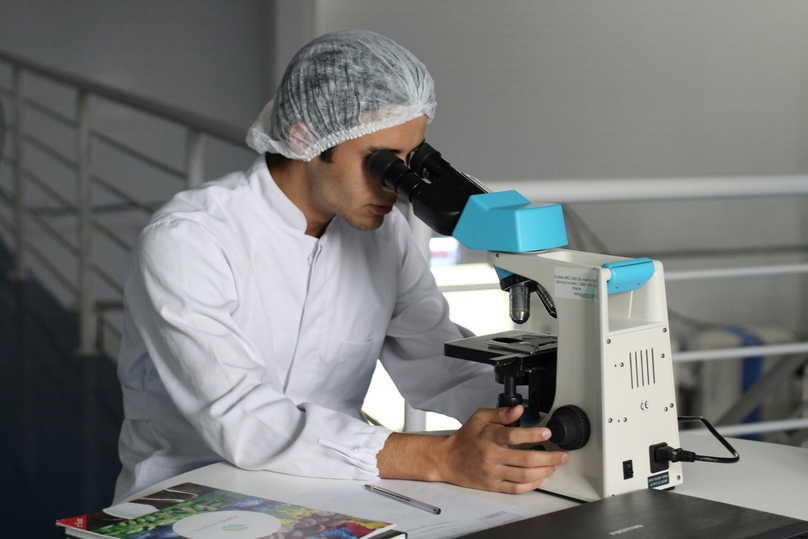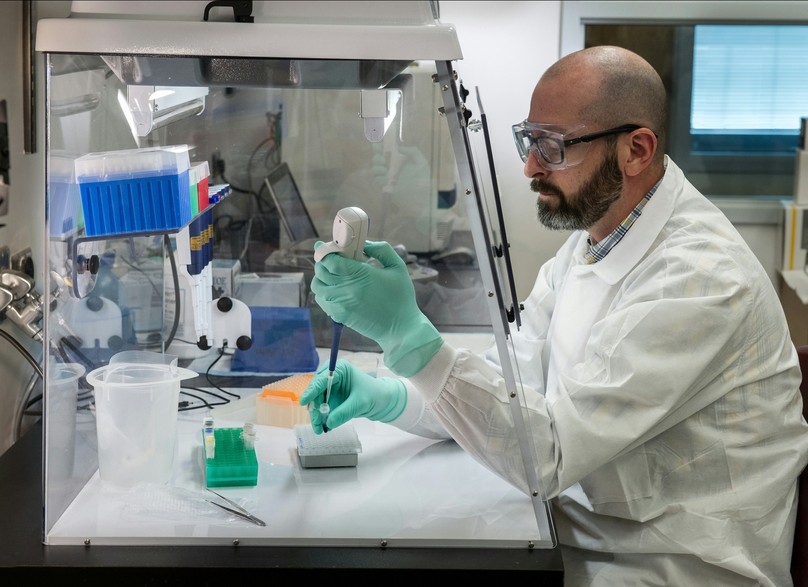In the fast-moving biotech world, having powerful and adaptable software is crucial. As research data gets more complex and datasets continue to expand, biotech labs need solutions that can keep pace. Scientists are increasingly relying on computational tools and techniques to collect, analyze, and interpret experimental data and results, often utilizing dozens of different software applications within a single project. From handling intricate research data to managing inventory and samples, the unique challenges of biotech research require specialized software. Embracing these advanced tools can dramatically boost productivity and spark innovation, paving the way for groundbreaking discoveries in life sciences.
In this blog, we’ll dive into how scalable software solutions can transform biotech research labs and drive their success.
Upgrading Life Sciences Labs: Overcoming Challenges and Driving Progress
Scaling up biotech operations presents significant challenges due to the inherent complexity of the process. Key issues include scaling scientific procedures, managing supply chains and costs, ensuring consistent manufacturing, and processing large volumes of data. Poor management of these factors can lead to delays, reduced quality, financial strain, and hindered company growth and market competitiveness.
To address these challenges, investing in scalable biotech software is advisable. Such advanced systems are designed to manage increasing data volumes, integrate various operational components, and maintain consistency across large-scale production. They also facilitate supply chain management, support technology transfer, enable researchers to fully leverage their data and enhance market access and commercialization efforts.
As technology evolves, these software solutions will play a key role in advancing biotech research.
Are you looking to boost your lab’s efficiency? Explore how Genemod’s Laboratory Information Management System (LIMS) can redefine your workflows and processes through innovative automation.
A Laboratory Information Management System (LIMS) has the potential to transform the laboratory operations. Designed with scalability in mind, it can accommodate the evolving needs of both emerging biotech startups and established enterprises. Implementing a LIMS provides access to a comprehensive array of critical data, which can substantially improve the efficiency and accuracy of laboratory processes.
The Crucial Role of Laboratory Information Systems in Enhancing Healthcare Quality
Laboratory Information Systems (LIS) are indispensable for ensuring high-quality healthcare delivery. Empirical evidence indicates a growing necessity for these systems to address advancing technological demands and increasing laboratory workloads. Given that laboratory tests furnish the majority of data critical for clinical decision-making, the automation of laboratory processes—including patient result verification—has markedly enhanced test throughput and reduced turnaround times. This advancement facilitates the rapid delivery of critical results to physicians, thereby contributing to improved clinical outcomes. Consequently, the increasing investment in advanced Laboratory Information Systems (LIS) is significantly enhancing the operational capabilities of clinical laboratories, which, in turn, improves clinical care processes and elevates overall healthcare quality. As these sophisticated LIS are integrated with complementary clinical information systems—such as Computerized Physician Order Entry (CPOE) and Electronic Medical Records (EMR)—they provide a synergistic effect that further enhances the quality of care delivered to patients. This integration facilitates streamlined workflows, enhances data accuracy, and promotes effective communication among healthcare providers.
Optimizing Research Efficiency Through Biotechnology Software
In the field of biotechnology research, the challenges posed by large datasets, complex workflows, and the management of numerous biological samples can be daunting. Biotechnology software emerges as a transformative solution, designed specifically to alleviate these burdens. By offering a comprehensive suite of tools tailored to support various aspects of biotech research and development, this software not only simplifies processes but also enhances research efficiency.
It allows researchers to focus their efforts on innovation rather than grappling with administrative challenges.
Consequently, the following outlines how researchers can redefine their work through the strategic use of biotechnology software:
Streamline Collaboration and Data Sharing
When managing research projects across multiple teams or institutions, the importance of seamless and secure data sharing cannot be overstated. Biological, clinical, and pharmacological research now often involves analyses of genomes, transcriptomes, proteomes, and interactomes, within and between individuals and across species. Due to large volumes, the analysis and integration of data generated by such high-throughput technologies have become computationally intensive, and analysis can no longer happen on a typical desktop computer. Scalable biotechnology software enhances efficient data sharing and collaboration among colleagues, regardless of their location. Simultaneously, it ensures that analyses are conducted in a reproducible manner. In clinical settings, the urgency of generating actionable results within hours adds another layer of complexity. Therefore, the integration of cloud storage and collaborative platforms is essential, as it enables real-time teamwork and accelerates the research process.
The Digital Notebook Transformation
The increasing adoption of digital technology in scientific research has led to an inevitable transition from traditional paper laboratory notebooks (PLNs) to digital ones. Electronic laboratory notebooks (ELNs) are replacing PLNs across the pharmaceutical industry and, to a greater extent, in life sciences labs within academic research.
Over recent years, the variety of ELNs has expanded dramatically, ranging from open-source solutions to commercial offerings. The growing popularity of touchscreen technology has further accelerated the evolution of ELN software, enhancing its functionality on tablet devices. This innovation provides users with a more intuitive and physical means to record and visualize data, facilitating a smoother transition from PLNs to ELNs.
A standout example is Genemod’s ELN, which offers robust data management features that simplify editing and organization. By adopting advanced biotechnology software, research teams can significantly boost their efficiency.
Reducing Manual Entry Errors
The automation of data collection and entry through an electronic lab notebook (ELN) significantly reduces the likelihood of errors commonly associated with manual data input. This software incorporates built-in rules and validation checks to ensure that data adheres to specified standards and formats, thereby identifying and rectifying errors before they can impact research outcomes. Furthermore, the ELN provides immediate feedback during data entry, allowing for the prompt correction of mistakes and thereby maintaining the accuracy and reliability of the research.
Inventory Management Software
Scalable inventory management software enables real-time tracking of inventory levels, usage, and reordering processes, ensuring that essential supplies are consistently available without interruptions to research activities. This software integrates seamlessly with procurement systems, automating the ordering and restocking processes, thereby minimizing administrative workload and maintaining optimal inventory levels. Additionally, it aids in cost management by monitoring expenses, analyzing usage patterns, and reducing waste, thereby enhancing the efficiency and cost-effectiveness of life sciences research laboratories.
Sample management software: Safeguarding Biological Assets
In life sciences labs, scientists deal with a variety of samples, like tissues, blood, DNA, cell cultures, biochemicals etc. sample management software is essential for keeping track of them and ensuring they’re available for research. With this software, researchers can safeguard the integrity of their samples and manage them efficiently.
Besides that scientists across various disciplines encounter difficulties in managing and maintaining prompt access to their research samples. Specifically, in extended and more substantial research projects, they are more likely to have the necessary resources and a larger dedicated staff for the management and handling of their samples.
Cloud-based solutions, including sample management software, are increasingly adopted in scientific settings due to their cost-effectiveness and labor-saving advantages, paralleling their popularity in commercial sectors.
The software provides real-time visibility into the status and location of samples allowing users to view dashboards, track movements, and check current conditions. Automated alerts can be configured to notify users of important events, such as deviations from environmental conditions or issues with sample handling. Additionally the software includes search functionality to quickly locate samples based on various criteria, such as ID, type, or location. Proper management of sample data allows researchers to repeat experiments and validate findings, which is crucial for scientific credibility and advancement.
Furthermore, biological samples are valuable and often subject to strict regulations. Sample management software provides robust data security features and ensures compliance with regulations such as HIPAA and GLP, safeguarding sensitive information and maintaining sample integrity.
To effectively handle the growing influx of samples and maintain a competitive edge in the swiftly advancing field of life sciences, it is essential for laboratories to invest in advanced sample management software.
Future Proof your Lab with Genemod
As biotechnology research laboratories expand, they encounter both significant challenges and promising opportunities for innovation. To effectively address these issues, it is essential for labs to implement solutions that ensure long-term viability.
Genemod’s software is specifically designed to optimize the efficiency of operations within life sciences research labs, addressing these challenges adeptly.
We offer assistance in selecting and customizing software tailored to your laboratory’s specific requirements. Contact us for a complimentary demonstration to explore how Genemod’s solutions can advance your research capabilities.
References
1. Nakagawa, A. S. (1994). LIMS: implementation and management. Royal society of chemistry.
2. Sepulveda, J. L. and D. S. Young (2013). "The ideal laboratory information system." Archives of Pathology and Laboratory Medicine 137(8): 1129-1140.
3. Riley, E. M., Hattaway, H. Z., & Felse, P. A. (2017). Implementation and use of cloud-based electronic lab notebook in a bioprocess engineering teaching laboratory. Journal of Biological Engineering, 11, 1-9.
4. Famili, P., & Cleary, S. (2022). Laboratory Information Management System (LIMS) and Electronic Data. Analytical Testing for the Pharmaceutical GMP Laboratory, 345-373.
5. Kranjc, T. (2021). Introduction to laboratory software solutions and differences between them. Digital Transformation of the Laboratory: A Practical Guide to the Connected Lab, 75-84.
6. Iyer, R., & Kudrle, W. IMPLEMENTATION OF AN ELECTRONIC LAB NOTEBOOK TO INTEGRATE.
7. Van Rossum, T., Tripp, B., & Daley, D. (2010). SLIMS—a user-friendly sample operations and inventory management system for genotyping labs. Bioinformatics, 26(14), 1808-1810.
8. Macneil, R. (2011). The benefits of integrated systems for managing both samples and experimental data: An opportunity for labs in universities and government research institutions to lead the way. Automated Experimentation, 3, 1-5.
9. Hewera, M., Nickel, A.-C., Knipprath, N., Muhammad, S., Fan, X., Steiger, H.-J., Hänggi, D., & Kahlert, U. D. (2020). An inexpensive and easy-to-implement approach to a Quality Management System for an academic research lab. F1000Research, 9.















